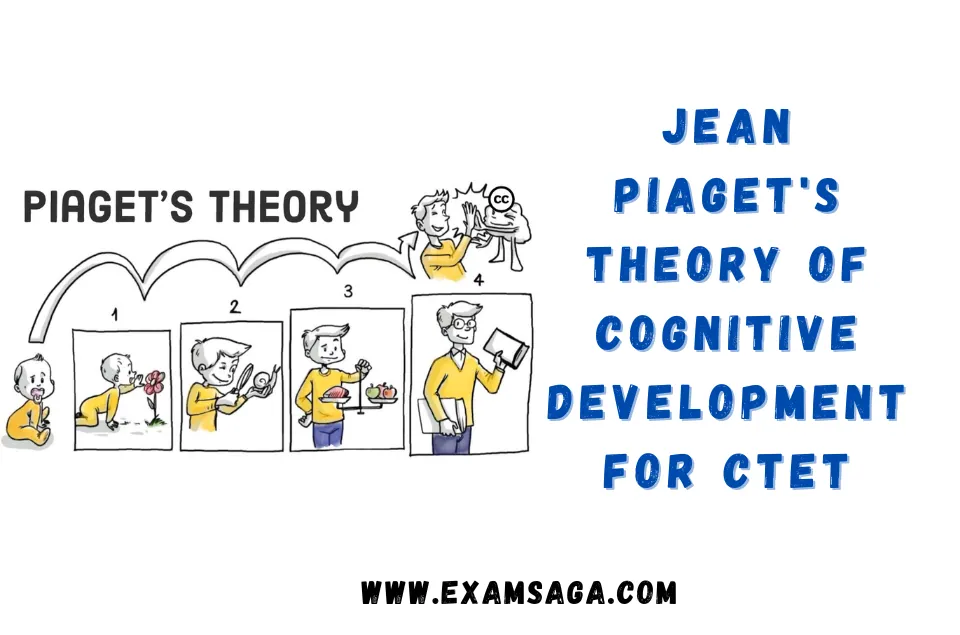Here we provide all the concepts and essential points of Jean Piaget’s theory of Cognitive Development For CTET and other teaching exams.
Jean Piaget’s theory of Cognitive Development is critical to CTET Child Development Theory. So If you are preparing for Ctet or other state teacher eligibility exams Jean Piaget’s theory is very important for your examination. Every year 3 to 4 questions are asked in the Ctet exam of Jean Piaget’s theory of Cognitive Development.
Piaget’s Theory of Cognitive Development
Piaget was a swiss psychologist.
Piaget’s theory tells us that the child is born with a mental/cognitive structure which develops and attains maximum growth around the age 14 or 15 years.

Stages of Cognitive Development
Sensorimotor (0 – 2 years of age),
Pre-operational (2 – 7 years),
Concrete operational (7 – 11 years) and
Formal operational (11- 15 years)
Sensorimotor Stage (0 to 2 years)
- The compound word combines “senses” and “motor skills.”
- It is characterized by the reflex actions of infants and children.
- They used their own physical or motor skills to develop cognitive skills or make their own world.
Pre-operational Stage (2 to 7 years)
- This period happens before operational thought is developed.
- Partially logical thinking or thought begins during this age.
- Also called the ‘ego-centric stage’.
- Pre-operational thinking can be and usually is illogical.
- For example, a child thinks that a tall slender glass has more water than a short wider glass just based on the looks of it, even if the volume of the water is the same in reality.
Concrete Operational Stage (7 to 12 years)
- Concrete means real or tangible.
- Logical thinking starts with this period.
- Children need concrete objects to demonstrate and reach conclusions.
- For example, we can find children of this stage solving mathematical problems with the help of blocks and fingers.
Formal Operational Stage (12 years and above)
- Abstract thought starts to develop.
- This stage encompasses the rest of our lives.
- Children become more capable of dealing with complex issues than in previous stages.
Lev Vygotsky’s Theory of Social-Cultural For CTET
NCF-2005 Question Answer For Ctet
MCQ Based On Jean Piaget’s theory of Cognitive Development For CTET
Q1. According to jean Piaget’s theory of cognitive development, hypothetico-deductive reasoning develops during?
A. sensorimotor stage.
B. pre-operational stage.
C. concrete operational stage.
D. formal operational stage.
[expand title=”Show Ans” swaptitle=”Hide Ans”]Ans-(D)[/expand]
Q2. Drawing implications from Piaget’s theory of cognitive development, a teacher of grades 6-8 in his classroom should?
A. discourage the use of logical arguments.
B. present problems that require reasoning-based solutions.
C. use only concrete materials to teach a concept.
D. rely solely on the prescribed syllabus.
[expand title=”Show Ans” swaptitle=”Hide Ans”]Ans-(B)[/expand]
Q3. Which of the following theorists while viewing children as active seekers of knowledge emphasized the influence of social and cultural content on their thinking?
A. John B. Watson.
B. Lev Vygotsky.
C. Jean Piaget.
D. Lawarence Kohlberg
[expand title=”Show Ans” swaptitle=”Hide Ans”]Ans-(B)[/expand]
Q4. Which of the following behaviours characterize the ‘concrete operational stage’ as proposed by Jean Piaget?
A. Hypothetical-deduction reasoning; propositional thought.
B. Conservation; class inclusion.
C. Deferred imitation; object permanence.
D. Make-believe play; irreversibility of thought.
[expand title=”Show Ans” swaptitle=”Hide Ans”]Ans-(B)[/expand]
Q5. Which of the following is a Piagetian construct in the context of the cognitive development of children?
A. Schemas.
B. Observational learning.
C. Conditioning.
D. Reinforcement.
[expand title=”Show Ans” swaptitle=”Hide Ans”]Ans-(A)[/expand]
Q6. Which of the following statements about learning is correct from a constructivist perspective?
A. Learning is the process of reproduction and recall.
B. Learning is the process of rote memorization.
C. Learning is the conditioning of behaviours by repetitive association.
D. Learning is the process of the construction of knowledge by active engagement.
[expand title=”Show Ans” swaptitle=”Hide Ans”]Ans-(D)[/expand]
Q7. The concept of object permanence is attained during Piaget’s __ stage of development.
A. sensorimotor.
B. preoperational.
C. concrete operational.
D. formal operational.
[expand title=”Show Ans” swaptitle=”Hide Ans”]Ans-(A)[/expand]
Q8. Which one of the following statements cannot be attributed to Piaget’s theory?
A. Development occurs in qualitative stages.
B. Children construct and use Knowledge about their world.
C. Learning takes place through constant practice.
D. Children act on their environment.
[expand title=”Show Ans” swaptitle=”Hide Ans”]Ans-(C)[/expand]
Q9. Which one of the following is not a limitation of preoperational thought?
A. Tendency to concentrate.
B. Development of symbolic thought.
C. Egocentrism.
D. Irreversibility.
[expand title=”Show Ans” swaptitle=”Hide Ans”]Ans-(B)[/expand]
Q10. One of the major accomplishments of the concrete operational stage is?
A. Animistic thinking.
B. Ability to conserve.
C. Hypothetic-deductive reasoning.
D. Secondary circular reactions
[expand title=”Show Ans” swaptitle=”Hide Ans”]Ans-(D)[/expand]
